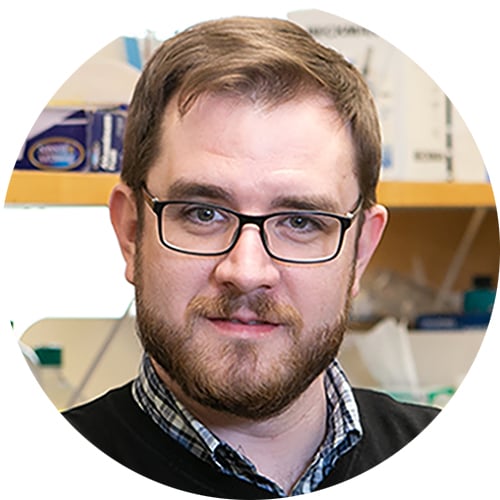Page Menu
MCCB Achievements
Our achievements in cutting-edge research have been propelled by strategic grants, fruitful collaborations, and recognition through prestigious honors and awards, fostering an environment of innovation that advances knowledge and drives impactful solutions across various disciplines.
-
Oct 1, 2024
![]()
 Scot Wolfe, PhD, and collaborator Charles Emerson, Jr. (professor of neurology and Director of the Wellstone Muscular Dystrophy Program at UMass Chan) have received a three-year grant from the Muscular Dystrophy Association to develop a precise genome editing therapy to correct a common mutation in the TCAP gene, which leads to the R7 subtype of limb girdle muscular dystrophy. The project, which combines the use of stem cell, nanoparticle, mouse model and genome editing technologies, will provide a versatile platform to develop correction therapies for other gene mutations that cause other types of muscular dystrophy.
Scot Wolfe, PhD, and collaborator Charles Emerson, Jr. (professor of neurology and Director of the Wellstone Muscular Dystrophy Program at UMass Chan) have received a three-year grant from the Muscular Dystrophy Association to develop a precise genome editing therapy to correct a common mutation in the TCAP gene, which leads to the R7 subtype of limb girdle muscular dystrophy. The project, which combines the use of stem cell, nanoparticle, mouse model and genome editing technologies, will provide a versatile platform to develop correction therapies for other gene mutations that cause other types of muscular dystrophy.
-
Sep 20, 2024
![]()

 Marcus Ruscetti, PhD, and collaborator (and MCCB adjunct faculty) Prabhani Atukorale, PhD, have been featured in a news spotlight by NBC10 Boston to showcase their ground-breaking combination immunotherapy approach that drammatically reduces pancreatic tumors in mice.
Marcus Ruscetti, PhD, and collaborator (and MCCB adjunct faculty) Prabhani Atukorale, PhD, have been featured in a news spotlight by NBC10 Boston to showcase their ground-breaking combination immunotherapy approach that drammatically reduces pancreatic tumors in mice.
Watch the video from NBC10 Boston, and read the related story from UMass Chan News.
-
Sep 1, 2024
![]()
 Yong-Xu Wang, PhD, has received NIH funding from the National Institute of Diabetes and Digestive and Kidney Diseases (NIDDK) to investigate a new approach for resolution of nonalcoholic fatty liver and nonalcoholic steatohepatitis by a novel adipokine. Nonalcoholic steatohepatitis (NASH) is a type of liver disease caused by the accumulation of fat in the organ, and can lead to cirrhosis, liver failure and cancer. The grant will determine whether an adipose-enriched cytokine identified by Dr. Wang’s group can improve NASH symptoms in mouse models of the disease, and will investigate the cytokine’s mechanism-of-action.
Yong-Xu Wang, PhD, has received NIH funding from the National Institute of Diabetes and Digestive and Kidney Diseases (NIDDK) to investigate a new approach for resolution of nonalcoholic fatty liver and nonalcoholic steatohepatitis by a novel adipokine. Nonalcoholic steatohepatitis (NASH) is a type of liver disease caused by the accumulation of fat in the organ, and can lead to cirrhosis, liver failure and cancer. The grant will determine whether an adipose-enriched cytokine identified by Dr. Wang’s group can improve NASH symptoms in mouse models of the disease, and will investigate the cytokine’s mechanism-of-action.
-
Sep 1, 2024
![]()
 Leslie Shaw, PhD, has received NIH funding from the National Cancer Institute (NCI) to investigate the role of IRS2 and mitotic regulation in breast cancer. The grant will explore the mechanism by which IRS2, a signaling adaptor protein, regulates chromosome segregation during cell division, and evaluate the feasibility of targeting IRS2 as a therapeutic strategy for the treatment of triple negative breast cancer, an aggressive type of breast cancer.
Leslie Shaw, PhD, has received NIH funding from the National Cancer Institute (NCI) to investigate the role of IRS2 and mitotic regulation in breast cancer. The grant will explore the mechanism by which IRS2, a signaling adaptor protein, regulates chromosome segregation during cell division, and evaluate the feasibility of targeting IRS2 as a therapeutic strategy for the treatment of triple negative breast cancer, an aggressive type of breast cancer.
-
Sep 1, 2024
![]()
 Will Flavahan, PhD, has received an NIH Director’s New Innovator Award, an initiative designed to support exceptionally creative early stage investigators who propose highly innovative research projects with the potential to impact areas important to NIH’s mission. Dr. Flavahan proposes to build upon a technique developed in his lab to generate comprehensive “training libraries” of DNA and RNA modifications that will expand the capabilities of third-generation sequencing for multi-dimensional genome and transcriptome analysis. The results of the project will provide tools for better understanding how nucleic acids are damaged during aging or cancer treatment.
Will Flavahan, PhD, has received an NIH Director’s New Innovator Award, an initiative designed to support exceptionally creative early stage investigators who propose highly innovative research projects with the potential to impact areas important to NIH’s mission. Dr. Flavahan proposes to build upon a technique developed in his lab to generate comprehensive “training libraries” of DNA and RNA modifications that will expand the capabilities of third-generation sequencing for multi-dimensional genome and transcriptome analysis. The results of the project will provide tools for better understanding how nucleic acids are damaged during aging or cancer treatment.
Read the full story from UMass Chan News.
-
Sep 1, 2024
![]()
 Nathan Lawson, PhD, has received NIH funding from the Eunice Kennedy Shriver National Institute of Child Health and Human Development (NICHD) to investigate the role of Rasa1 in embryonic development. Using zebrafish as an animal model, the grant aims to provide valuable insight into the role of Rasa1, a negative regulator of the Ras GTPase, in embryonic development and how its deficiency contributes to formation of vascular and lymphatic anomalies—defects that appear at birth and can have major negative health impacts.
Nathan Lawson, PhD, has received NIH funding from the Eunice Kennedy Shriver National Institute of Child Health and Human Development (NICHD) to investigate the role of Rasa1 in embryonic development. Using zebrafish as an animal model, the grant aims to provide valuable insight into the role of Rasa1, a negative regulator of the Ras GTPase, in embryonic development and how its deficiency contributes to formation of vascular and lymphatic anomalies—defects that appear at birth and can have major negative health impacts.